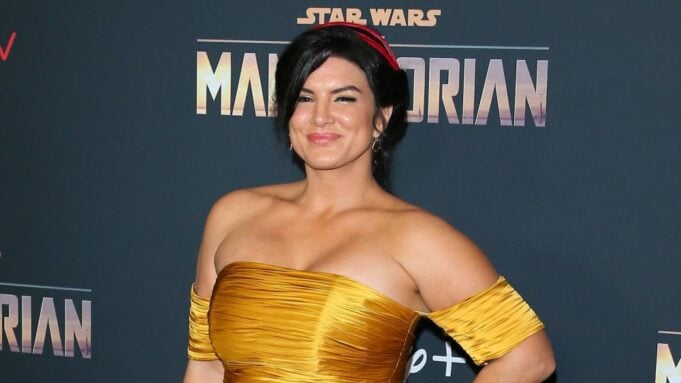Disney argued Tuesday that it had a First Amendment right to fire Gina Carano, the actor who played a bounty hunter on “The Mandalorian,” after she allegedly trivialized the Holocaust in an Instagram post.
Carano sued in February, arguing that the company unlawfully retaliated against her for expressing her personal political views, which were at odds with Disney’s preferred ideology.
Disney’s lawyers filed a motion on Tuesday to throw out the lawsuit, arguing that it has “a constitutional right not to associate its artistic expression with Carano’s speech.”
The case touches on a hot-button controversy over speech rights on social media. Elon Musk, the owner of X, formerly known as Twitter, announced last August that he would pay the legal bills of employees who had been fired for their posts on his platform. He later agreed to fund Carano’s lawsuit against Disney.
Carano was fired in February 2021, after she analogized the treatment of modern-day conservatives to the persecution of Jews in Nazi Germany.
“Because history is edited, most people today don’t realize that to get to the point where Nazi soldiers could easily round up thousands of Jews, the government first made their own neighbors hate them simply for being Jews,” she wrote. “How is that any different from hating someone for their political views?”
Carano had faced significant pushback for earlier social media posts, in which she strongly objected to COVID restrictions, questioned the legitimacy of the 2020 election, and refused to show support for trans rights. According to her lawsuit, Disney forced her to have a 90-minute Zoom meeting with GLAAD, the LGBTQ rights organization, after she posted that her pronouns are “boop/bop/beep.”
But for Disney, the Nazi post was “the final straw,” according to the company’s motion. The company argued that the post trivialized the Holocaust by referred to “thousands” of Jews, not “millions,” and by likening their experience to those of contemporary conservatives who face scorn on social media.
“Disney had enough,” the motion states.
The company put out a statement the same day saying it had no plans to hire her in the future, and that her comments were “abhorrent and unacceptable.”
Carano sued under a California law that prohibits employers from retaliating against employees for political activity.
In its motion to dismiss, Disney argued that there is a broad exception for companies whose business is to engage in speech, such as newspapers and entertainment companies. To support its argument, the company invoked a law review article and a commentary written by one of Carano’s attorneys, UCLA law professor Eugene Volokh.
“Employers that speak must necessarily speak through their employees; and when an employee or prospective employee says things, even off the job, that would undermine the employer’s message, the employer must be able to distance itself from the employee,” Volokh wrote in 2022.
Disney also cited two Supreme Court cases — Boy Scouts of America v. Dale and Hurley v. Irish-American Gay, Lesbian, and Bisexual Group of Boston — in which the court held that organizations could not be compelled to associate with supporters of gay rights.
“Disney thus was entitled to protect its creative speech in the ‘Star Wars’ series from association with views Disney and many viewers (and potential viewers) considered offensive and contrary to Disney’s values,” the company’s lawyers wrote. “Carano’s presence as a prominent actor on ‘The Mandalorian’ interfered with Disney’s choice not to produce a show associated with her beliefs.”
Carano has also alleged sex discrimination, arguing that Disney took no action against male actors Pedro Pascal and Mark Hamill when they made social media posts analogizing President Trump and his supporters to Nazis.
Disney argued that those statements were not comparable to Carano’s, and also that it would not matter if they were.
“The First Amendment protects Disney’s decision to dissociate itself from some speech but not from other, different speech,” the company’s lawyers wrote. “The First Amendment mandates deference to the speaker’s own decisions about what speech to associate with, even if others might consider those decisions ‘internally inconsistent’… Carano thus cannot stake out a discrimination claim by alleging that Disney accorded different treatment to different statements by different actors.”
From Variety US































